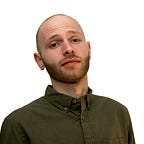I’m looking for a new job, and a few weeks ago I applied for a back-end internship with Shopify. The internship is starting in January of 2022, It’s 4 to 8 months long, paid, and remote. So naturally, I wanted It and I wanted it badly. The application itself was simple enough, consisting of a few questions about experience and motivations, nothing too technical nor corporate. The main hill to climb for the application was the required coding challenge; “Build an Image Repository” however you want. I furiously built the most comprehensively tested app I’ve ever made in a 5-day sprint (I wrote about the project here) and submitted my application a few hours before they closed. Then I waited.
Notification & Preparation
I submitted my application on Tuesday, September 21st, and waited. At this point, I was unsure of whether my application would even be looked at. Nine days later on the 30th, I found an email in my inbox with a request to schedule the first of two potential interviews; the “Life Story” interview which is a soft-skills/culture interview. After picking a date and time I was given access to Shopify’s internship information section which had several pages about the culture at Shopify, the company’s mission statement, values, and what they look for in internship candidates.
I immediately set about poring over the information to collect keywords and key concepts to work into my interview and what I found was that my values and motivations align with Shopify’s and It didn’t take much work to make sure I could hit all of the necessary notes during my performance because they we’re the notes I would have hit otherwise.
The Prompt
Four days later on the morning of the interview, I checked my webcam and microphone and opened the google hangouts link I was sent in the previous email. A few minutes later I was joined by my interviewer who like myself, was sitting on a webcam in their bedroom. Any traces of apprehension I had the interview dissolved and we started talking.
After a quick run-through of the interviewing process and what I could expect from the next interview if I was moved forward, he said he only had one pre-written question to start the conversation which was “Why did you start programming”.
Topics I hit
During the “interview” the conversation hit several topics including; what I wanted to be as a child, how I got interested in programming, my job history, my education, and why I want to leave my job. It was unlike any interview I’ve ever had there was no overly corporate wording or preoccupation with “professionalism” it was just a casual conversation. When talking about all of the topics I tried to focus on what matched the information I got from Shopify or otherwise showed that my values were compatible with the company. For the most part, I just let the conversation flow, I felt like the conversation was going well and I was building a good rapport with the interviewer.
What I felt was the most sensitive topic to speak about was why I am leaving my current job. It does not matter how bad your current job is, slagging off a previous or current employer to an interviewer is a careful balancing act. On the one hand, no one expects the answer to that question to be “I am fully satisfied with my employer culture, job responsibilities, pay, benefits, and commute so I am looking for a new job” but on the other hand no one likes a whiner and the way you criticize something says volumes about who you are as a person. My strategy in answering this question was to focus on what getting a new job could provide me, namely; my skills have changed and I do not have an opportunity to grow them at my current position, I have a very small impact in that I manage 3–4 websites and update the front end occasionally while I’d like to work on something bigger that can make a difference to people, and finally that I am passionate about coding and I would like to do far more of it than is needed at my current position. I felt this approach was good because it clearly illustrated why my current position was unfit for me in a way that did not put blame on others and did not involve criticism or complaints no matter how many I may have.
How It went
When the hour was up the interviewer reiterated what I could expect from the next interview if I was moved forward in the process then we exchanged thank you’s and goodbyes and hung up. I sat there for a moment overflowing with excitement and hope as and as I calmed down I went over the conversation in my mind and felt confident I did a decent job.
Conclusion and Continuation
After the high of the first interview of my job search tapered off I began planning out how I would prepare for the next interview. The second interview was a technical interview the first 30 minutes of which would be an intense grilling on a personal project followed by an hour of live problem solving with code and talking over my thought process. I figured I would use the application coding challenge for the grilling considering it was my most recent and thus most familiar project and I would run through a few leetcode questions. My first interview was on Monday the 4th, two days later at 4 p.m. I received an email telling me my second interview was going to be the next morning at 9:30.
I plan to write an article about the second interview. I will link it here when it’s complete.
If you enjoyed my writing feel free to check out my website and connect with me on LinkedIn
